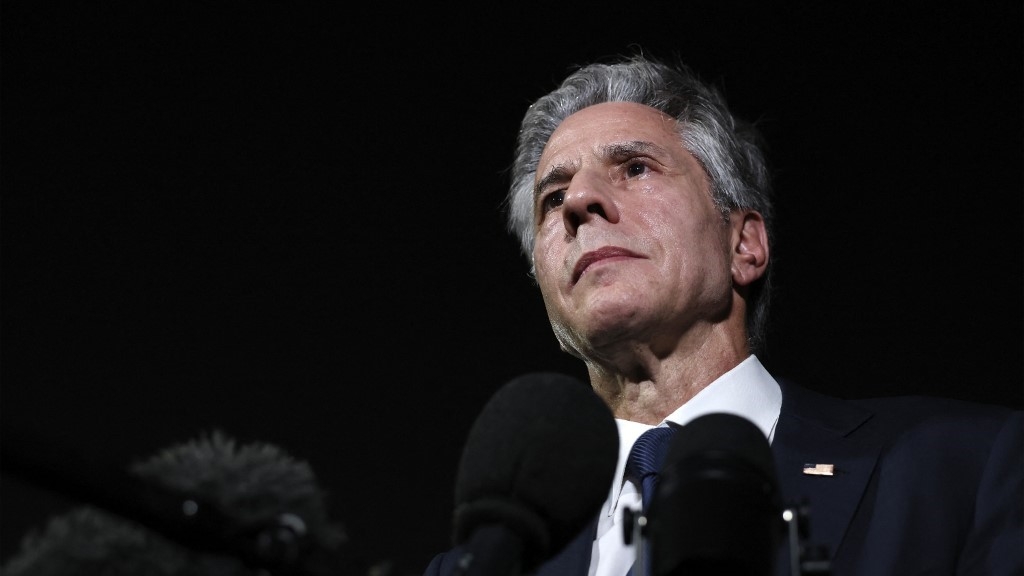Blinken 'sentenced ceasefire talks to death' with Hamas, Netanyahu remarks

US Secretary of State Antony Blinken sentenced the Gaza ceasefire negotiations to death by implying Hamas was the obstacle to a deal and that Israeli Prime Minister Benjamin Netanyahu had accepted it, Israeli officials told local media.
Blinken's comments by expressing "optimism" about the outcome of the latest round of talks may have ended up sabotaging the chance for success, the sources said.
Negotiations for an end to the months-long Israeli assault on Gaza have, in recent days, hinged on demands by Netanyahu that Israel maintain control of the Philadelphi Corridor and the Netzarim Corridor.
The Philadelphi Corridor is a 14km-long, 100 metre-wide demilitarised buffer zone along the border between Gaza and Egypt, established by two Egyptian-Israeli agreements in 1979 and 2005, while the Netzarim Corridor is a 6km stretch of land dividing northern and southern Gaza that was established by the Israeli military during the current war on Gaza.
Netanyahu has repeatedly vowed Israel will retain control over these areas and maintain a military presence at the Rafah border crossing, a crucial lifeline for aid and commercial goods that has been closed since early May.
New MEE newsletter: Jerusalem Dispatch
Sign up to get the latest insights and analysis on Israel-Palestine, alongside Turkey Unpacked and other MEE newsletters
Despite this, Blinken on Monday said that Netanyahu had accepted a "bridging proposal" put forward by Washington that included a "detailed plan" for the withdrawal of Israeli soldiers from Gaza.
Sources familiar with the talks speaking to Ynet said on Wednesday that Blinken's comments, saying the ball was now in Hamas's court, had likely ruined the chances of bringing the negotiations to a planned summit in Cairo later this week and the chances of agreeing a deal.
'Blinken made a very serious foul here that indicates innocence, amateurism, naivety and lack of understanding'
- Israeli source
"Blinken made a very serious foul here that indicates innocence, amateurism, naivety and lack of understanding," they said.
"He broadcast optimism from intra-American political considerations, so that the Democratic convention in Chicago would go smoothly, but senior officials of the Israeli negotiating team who listened to his press conference wanted to dispel the speculations."
The sources said Blinken had given Netanyahu a "gift" with the comments, and fatally undermined the negotiations.
"There is no deal and there is no summit if the Israeli insistence on deploying forces along the Philadelphi axis continues," said the source.
"What was implied in Blinken's words is that the US is giving Netanyahu support for IDF forces to remain in Philadelphi, while both the Egyptians refuse and Hamas refuses."
'Reversal'
On Tuesday, sources close to Hamas told Middle East Eye they would not engage with the latest US ceasefire proposal because it deviates from President Joe Biden's outline announced in May.
The sources said the new proposal, discussed in Qatar last week, differed from what Hamas had previously agreed to and included additional demands from Netanyahu that Hamas found unacceptable.
Hamas issued a statement on Tuesday reaffirming its commitment to the 2 July proposal, based on Biden’s announcement on 31 May.
The group described the new proposal as a "reversal" of previous US-backed plans and "an American submission to the terrorist Netanyahu’s new conditions and his criminal plans towards the Gaza Strip".
Earlier this week, three senior Egyptian sources told MEE that Egypt and Israel had reached an understanding that would allow for an Israeli security presence along the Philadelphi Corridor.
According to the sources, one option is for Israel to maintain boots on the ground. The alternative is to replace the troops with an underground barrier, electronic monitoring equipment and occasional patrols.
The officials told MEE that Egypt would agree to these options if Palestinian factions, particularly Hamas, supported them.
Middle East Eye delivers independent and unrivalled coverage and analysis of the Middle East, North Africa and beyond. To learn more about republishing this content and the associated fees, please fill out this form. More about MEE can be found here.




